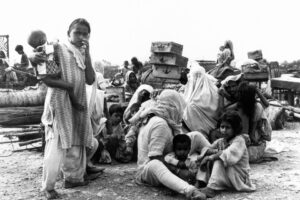Abstract:
This article examines the findings from a recent webinar hosted by the International Center for Multigenerational Legacies of Trauma (ICMGLT) exploring the lifelong and intergenerational impacts of the 1994 genocide against the Tutsi in Rwanda. Three decades after the atrocities that claimed over one million lives, Rwandan mental health professionals, survivors, and children of survivors presented compelling evidence of trauma transmission across generations through neurological, hormonal, and epigenetic pathways. The discussion highlighted prevalent coping mechanisms including substance abuse, identified cultural barriers to seeking mental health support, and showcased extraordinary resilience in post-genocide Rwandan society. This psychohistorical analysis provides crucial insights into how historical trauma shapes contemporary individual and collective identities while offering practical approaches for healing across generations.
The profound psychological impact of genocide extends far beyond the immediate victims, reverberating through subsequent generations in complex ways that merge biological, psychological, and social dimensions. Thirty-one years after the 1994 genocide against the Tutsi in Rwanda claimed over one million lives in just 100 days, the International Center for Multigenerational Legacies of Trauma (ICMGLT, www.icmglt.org) convened a webinar exploring how this historical trauma continues to shape Rwandan society across generations. The April 28, 2025, session brought together mental health professionals, survivors, and children of survivors who presented both scientific evidence and deeply personal narratives illustrating the persistent yet often invisible impacts of genocidal violence.
Psychohistory: A Framework for Understanding Collective Trauma
Dr. Yael Danieli, who moderated the webinar, established psychohistory as the critical framework for understanding these multigenerational impacts. As a pioneering clinical psychologist who developed programs for Nazi Holocaust survivors in the 1970s, Dr. Danieli emphasized that psychohistory allows us to examine how historical trauma becomes embedded in both individual psyches and collective consciousness, ultimately shaping present choices, identities, and social dynamics. This perspective acknowledges that traumatic historical events like genocide are not merely past occurrences but living psychological realities that continue to influence behavior across generations.
Mechanisms of Trauma Transmission
Edmond Dufatanye, a certified group work practitioner with extensive clinical experience, presented compelling scientific evidence demonstrating the neurobiological pathways through which trauma passes from generation to generation. His presentation detailed how trauma alters brain structure and function, particularly in regions associated with stress response such as the amygdala and prefrontal cortex. These neurological changes, alongside dysregulation of stress hormones and epigenetic modifications that affect gene expression without altering DNA, create biological vulnerabilities that can manifest in subsequent generations.
The statistical evidence supporting these transmission mechanisms is stark. The 2018 Rwanda Mental Health Survey revealed PTSD rates of 27.8% among survivors compared to just 3.6% in the general population. Similarly, alcohol use disorders occur at nearly three times the general rate among genocide survivors, representing an attempt to manage overwhelming emotional pain. These findings align with global research on trauma survivors and their descendants, suggesting consistent patterns in how extreme historical trauma manifests across diverse cultural contexts.
Lived Experience: First- and Second-Generation Perspectives
The webinar’s most powerful insights came from the lived experiences of the panelists themselves. Dr. Gisele Umutoni Gashugi, born during the genocide after her father was killed, embodied the second-generation survivor experience. Her testimony revealed the complex nature of inherited trauma – growing up with unexplained sadness and physical pain that she eventually recognized as psychosomatic manifestations of trauma passed down from her mother’s unspoken grief. As both a medical doctor and genocide survivor, Gashugi’s perspective bridged clinical knowledge and personal experience, highlighting how trauma can manifest physically even when not consciously acknowledged.
Antoine Hagenimana provided the harrowing perspective of a child survivor who witnessed his family’s murder at age 11. His experience of surviving by hiding and disguising himself as a girl, followed by rebuilding a life with his mother (a rape survivor), illustrated the profound resilience that characterizes many genocide survivors. His emphasis that “resilience is not just survival but choosing hope over hate” offers a crucial perspective for understanding post-traumatic growth in extreme circumstances.
Cultural Barriers to Healing
A recurring theme throughout the webinar was the significant cultural barriers that complicate healing processes in Rwanda. The panelists described a cultural tendency to internalize struggles, with seeking psychological help often stigmatized and trauma frequently conflated with severe mental disorders. In many Rwandan communities, discussing psychological suffering remains taboo, creating a silence that can inadvertently amplify trauma’s impact across generations.
This cultural context necessitates culturally responsive approaches to mental health intervention. Dufatanye advocated for community-based education to normalize mental health challenges and proactive outreach rather than office-based services. This approach acknowledges that effective trauma treatment must engage with cultural realities rather than imposing Western therapeutic models without adaptation.
Parenting After Genocide: Breaking Cycles of Trauma
A particularly nuanced discussion emerged around how survivors share their stories with children without transmitting trauma or fostering hatred. Dr. Gashugi explained her careful approach with her eight-year-old daughter, emphasizing historical truth while avoiding instilling fear or hatred. By acknowledging that not all Hutu were perpetrators and encouraging memorial visits as a way to honor lost family members, she models an approach that preserves historical truth while creating space for healing.
Dufatanye suggested discussing pre-genocide harmony and tailoring conversations to a child’s developmental stage, acknowledging the ongoing challenge of combating genocide ideology that persists in neighboring regions. These thoughtful approaches to parenting after genocide offer important insights into how families can navigate the tension between remembrance and recovery.
Physical Manifestations of Psychological Trauma
The webinar also highlighted the often-overlooked physiological toll of historical trauma. Dr. Gashugi observed that survivors and their children frequently develop stress-related conditions like hypertension and diabetes. Dufatanye noted psychosomatic disorders among adolescents, including instances of mass hysteria in schools linked to unspoken family trauma. These observations align with growing research showing how PTSD elevates oxidative stress and affects metabolic health, creating tangible biological impacts from psychological suffering.
This biological dimension underscores the importance of integrating physical and mental health approaches when addressing the needs of trauma-affected populations. It also challenges simplistic notions that historical trauma is “all in the mind,” demonstrating how profoundly psychological suffering can manifest in bodily systems.
National Healing Initiatives
The panelists acknowledged Rwanda’s governmental efforts to expand mental health services, including professionals placed in health centers, addiction treatment facilities, and school-based counseling programs. The Ministry of National Unity and civil society organizations like the Imbuto Foundation support reconciliation processes, while annual commemorations facilitate truth-telling and collective mourning.
However, Dufatanye called for strategies specifically informed by understanding of intergenerational trauma, particularly for addressing youth substance abuse. This highlights a crucial gap in current approaches – while general mental health services have expanded, programs tailored to the unique dynamics of intergenerational trauma remain limited.
Global Implications and Call to Action
The webinar concluded with a unified call to action: recognize intergenerational trauma, combat genocide denial, and promote resilience through unity. Dr. Danieli proposed a 2026 conference to unite genocide-affected groups worldwide, building on a 2001 meeting in Kigali, to share lessons and develop prevention strategies.
This vision acknowledges that while genocides occur in specific historical and cultural contexts, they share common psychological impacts that transcend these boundaries. By bringing together affected communities from different genocides – including the Holocaust, Cambodia, Bosnia, Rwanda, and others – such an initiative could build collective wisdom about healing historical wounds.
Conclusion: The Continuing Relevance of Psychohistory
As Rwanda marks the 31st commemoration of the genocide against the Tutsi, this webinar demonstrated the enduring relevance of psychohistorical approaches to understanding collective trauma. The complex interplay of biological, psychological, and social factors in trauma transmission reveals how profound historical events shape present realities, not only for direct survivors but potentially for generations to come.
Yet perhaps the most significant insight from this gathering was the remarkable capacity for resilience in the human spirit. Despite unimaginable suffering, the panelists embodied what Dufatanye’s Kinyarwanda name means – “let’s work together” – demonstrating how collective healing and meaning-making can emerge even from history’s darkest chapters. Their testimonies remind us that while the past cannot be changed, how we integrate and respond to it shapes our future in profound ways.
The psychohistorical perspective offered through this webinar provides not only theoretical understanding but practical approaches for addressing collective trauma globally. As societies worldwide grapple with historical injustices and their ongoing psychological impacts, Rwanda’s journey offers both caution about trauma’s persistent effects and hope for meaningful healing across generations.
About the Author:
Inna Rozentsvit, MD, PhD, MBA, MSciEd, is a neurologist and neurorehabilitation specialist trained in psychoanalysis. She is a founder and neuropsychoeducator at the non-profit organization NeurorecoverySolutions, Inc., a programs director at the Object Relations Institute for Psychotherapy and Psychoanalysis, and editor-in-chief of the ORI Academic Press, MindMend Publishing Co., and MindConsiliums, the interdisciplinary journal.
She may be contacted at inna.rozentsvit@gmail.com or www.innarozentsvit.com. Keywords:
collective trauma, cultural barriers, epigenetics, intergenerational trauma, mental health, post-traumatic growth, psychohistory; resilience, Rwanda genocide, trauma transmission
How to Cite This:
Rozentsvit, I. (2025). Intergenerational trauma and resilience: Insights from the 1994 Rwandan genocide against the Tutsi. Psychohistory News, 44(2), 12.
Editorial Disclaimer: The views and interpretations expressed in this article are those of the author and do not necessarily reflect the position of Psychohistory News or the International Psychohistorical Association. For comments, please contact the author directly or submit a response to our Letters to the Editor section.




